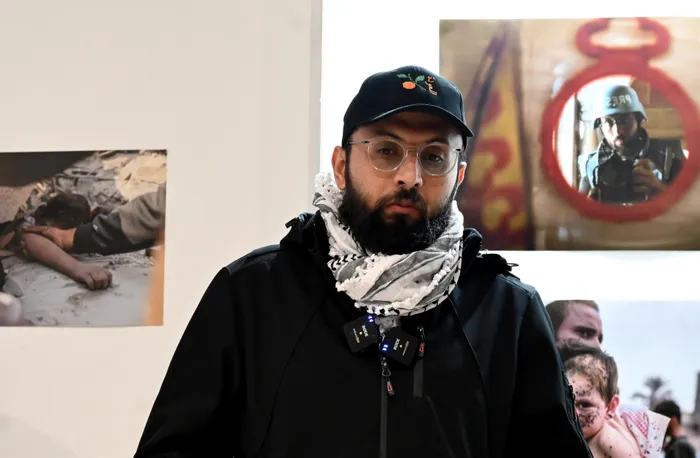Gaza War photojournalist Belal Khaled Tell South Africa: 'If this isn't genocide, what is?'

Palestinian journalist Belal Khaled shares a powerful firsthand account of surviving and documenting the Gaza genocide during a Cape Town solidarity event.
Image: Ayanda Ndamane/ Independent Media
Palestinian photojournalist Belal Khaled, who spent 300 days documenting the war in Gaza, shared his searing personal testimony at the “Journalism on the Frontline” event in Cape Town, offering South African journalists and academics a firsthand account of what it means to report from within a genocide.
Hosted by humanitarian leader Dr Imtiaz Sooliman of the Gift of the Givers, the gathering brought together media professionals, journalism scholars, and solidarity activists for a night of reflection, resistance, and remembrance. But it was Khaled’s words, raw and unfiltered, that pierced the room.
“We are not just journalists, we are also witnesses, and we are a part of the story,” Khaled said. “In Gaza, you don’t cover the story, you live it.”
The event also featured a screening of “Eyes of Gaza”, a photo exhibition of frontline images, and a panel discussion on censorship, fear, and the global failure to protect journalists.
Khaled called on international media to stop being afraid to name what is happening.
“More than 55,000 people have been killed. If this is not genocide, what is it?”
Khaled, who returned to Gaza on October 7 to document the Israeli bombardment, spoke of the unbearable emotional toll of surviving while others around him perished.
“Maybe I survived with my body, but we didn’t survive with our souls. We’re dying every day when we watch our families, my family, my neighbours, my colleagues, suffer, and we cannot do anything.”
He described how Palestinian journalists worked without the most basic necessities, no offices, no homes, and often, no food or water.
“We didn’t sleep. Totally. Because the massacre was happening from morning until night. There was no specific time for bombing.”
Despite the relentless danger, Khaled said there was never a choice to walk away.
“If we turn off our cameras, the truth disappears. Each crime must be documented. These are not numbers, these are names, lives, families.”
Khaled lost dozens of colleagues during the war, including some of his closest friends with whom he shared tents and assignments.
“I lost a lot of my close friends, because they were covering the truth.”
Speaking directly to fellow journalists, he said; “If we didn’t do this, if we didn’t show the truth, the silence would become part of the crime.”
The panel discussion that followed saw leading journalists respond to Khaled’s testimony with both reflection and resolve.
Fahmida Miller, an international correspondent, addressed the global silence and selective outrage.
“There is a hierarchy in terms of which journalists matter and which don’t,” she said.
“Attacks on media in Gaza have not been met with the same condemnation we’ve seen in other conflicts. It took far too long for many in the profession to speak out.”
Miller emphasised the importance of access and accountability.
“The gagging of journalists can happen anywhere, and what we’ve seen in Gaza is censorship taken to its most brutal form. An attack on a journalist in Gaza is an attack on the profession globally.”
Kevin Bloom, senior writer at the Daily Maverick, offered a raw and deeply personal reflection.
“I was raised as a young Zionist. I went to Jewish day school. I did IDF training. But after October 7, I had to confront the lies I was taught,” he said.
“Now, I write in the first person because the stakes are so high. My family calls me a self-hating Jew, but I know the truth has to be told.”
Bloom didn’t hold back in his criticism of organized denialism.
“Everything that comes out of the mouths of the SA Zionist Federation, the Board of Deputies, the Chief Rabbi, it’s a lie. And it’s a murderous lie.”
As Gaza remains largely inaccessible to international reporters, Khaled reminded the world that truth is still alive, through those willing to risk everything to tell it.
IOL News
Related Topics: